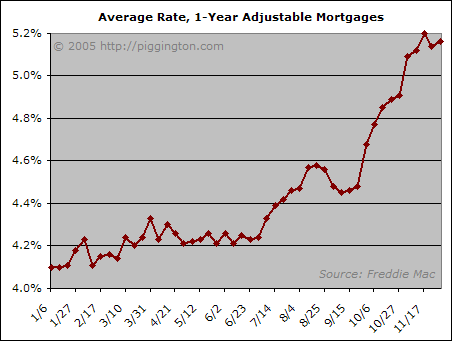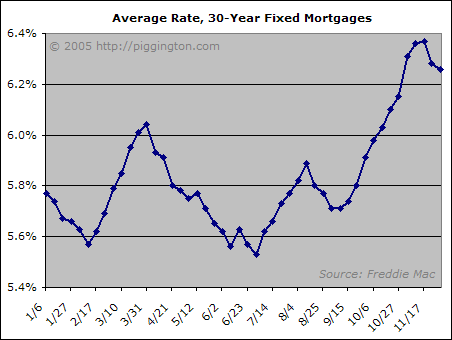Mortgage rates have finally taken a breather, but they are still noticably higher than they were last month—and much higher than they were this summer. Meanwhile, inflation expectations are too high for the Fed to stop tightening, and the OCC has purveyors of non-traditional mortgages in its crosshairs. None of this looks very promising for a housing market that lives and dies by E-Z credit…
Let’s have a look at those rates:


After rising uninterrupted for almost 3 months, rates on both fixed and adjustable mortgages finally retreated slightly in November. They are nontheless higher than they were in October, at which time they were higher than in September, and so on. Rates on ARMs (which comprise the large majority of recent San Diego mortgages) have increased by 22% since June, corresponding to about an 11% increase in the monthly payment on the equivalent loan.
Of course, buyers are easing this pain by turning to so-called "exotic" mortgages, which come in many forms but which all at their essence involve lower payments now in exchange for higher payments later. Most people who use these loans to purchase homes they couldn’t afford otherwise are effectively speculating that by the time the "payment shock" arrives, they will either be making a lot more money or their homes will have increased in equity to the extent that they can cash out and move up. It’s a risky proposition—a fact which has not escaped John Dugan, the new head of the OCC. As I wrote about earlier in the week, Dugan has been sounding rather stern warnings on exotic mortgages, and intends to release a set of stricter lending guidelines within the month.
As much as the media gets worked up over short-term data points such as the number of home sales in a given month, I think this OCC thing is the biggest story in housing right now. Maybe Dugan is blowing smoke. Maybe he’s just talking tough to scare the banks, and maybe the new guidelines will be toothless. I wouldn’t be terribly surprised if it played out that way. But if it doesn’t play out that way, the housing market’s fortunes will change fast. I will of course be following the OCC situation closely.
In the meantime, the folks at the Fed aren’t likely to be of help either. As I’ve discussed before, I think that the Fed is much less concerned with inflation itself than with inflation expectations. Notwithstanding recent Wall Street noise about a pause in tightening, inflation expectations (while lower than in September) are still too high for the Fed to stop hiking. This may change in the future, especially if the housing slowdown feeds into an economic downturn, but for now I don’t think anyone should look to the Federal Reserve for help.
All in all, I believe the credit markets present a very worrying situation for San Diego housing. Rates have risen much and are likely to rise more, and at the same time we finally have a regulatory body punching in to the fact that reckless mortgage lending may be a bad idea. If this situation keeps up, San Diego home prices will start to feel some serious pressure.
